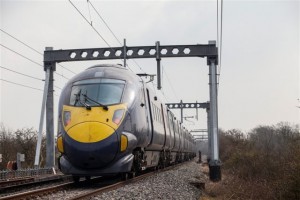The government has effectively scrapped the much-needed electrification of Bristol’s mainline rail services – including on the intercity link from Temple Meads to London – despite millions of pounds worth of work already being carried out around the city.
Bristol business leaders and MPs reacted angrily to what they saw as a broken election promise. Bristol City Council, Business West – which runs the city’s Chamber of Commerce – and the Local Enterprise Partnership (LEP) – are understood to preparing to lobby the government hard over the decision.
Full electrification between Temple Meads and Paddington would have cut journey times to the capital by just under 20 minutes to around one hour, 20 minutes.
Transport minister Paul Maynard announced on Tuesday that he had deferred indefinitely the electrification of the lines between Bristol Temple Meads and Bath and between Temple Meads and Parkway.
The move – described by Labour as “yet another example of a broken Tory promise on rail” – means new high-speed trains to be introduced by Great Western Railway (GWR) will run under traditional diesel power tobetween Bristol and Bath, where they will switch to using the new overhead electric power.
Electric trains are cleaner, quieter and more reliable. However, GWR decided to buy new Hitachi electro-diesel trainsets amid the many delays to electrification.
Work costing millions of pounds raising bridges to accommodate the overhead electric lines has already been carried out around Bristol – in some cases closing roads for long periods. New signalling is also being introduced.
Bristol South Labour MP Karin Smyth said: “Passengers will be horrified and mystified that, having been promised electrification and having endured considerable disruption already, the Government is now pulling the plug.”
Bristol West MP Thangham Debbonaire said she was “horrified” that the government had been “so short-sighted”.
“They’ve shown a complete lack of ambition with major infrastructure and that’s the exact opposite of what we need to do,” she said.
“in an approaching post-Brexit world, what we need to do is make ourselves as competitive as possible and that means infrastructure and good transport.”
Bristol East MP Kerry McCarthy said she planned to quiz the Department for Transport on the reasons for the decision.
“Bristol is one of the fastest-growing city economies in the UK and is making a significant contribution to economic growth – the government should be backing Bristol by investing in its infrastructure,” she said.
“Local people have already endured disruption while the works are being carried out, and the government now has questions to answer as to why it has pulled the plug.
“Why is the rail minister saying that the benefits – newer trains and more capacity – can be achieved without electrification of parts of the track when they clearly did not regard this as the case before?”
The head of international property agency JLL’s Bristol office, Jeremy Richards, said electrification was crucial for a competitive regional economy and called for clarity over the timetable for its introduction.
“It will encourage more businesses to relocate from the South East to Bristol and South Wales while also effectively putting Bristol in London’s commuter belt,” he said.
“News of delays to electrify certain stretches of the line, namely Bristol Temple Meads to Bath Spa and Bristol Parkway to Bristol Temple Meads in our region, is worrying.
“If this is simply a matter of deferral, there is less cause for concern, although we would welcome a clear timeline for completion of the project. We also need to look beyond the rhetoric and examine what material impact this will have on journey times and passenger experience. The detail on this is yet to be made clear.”
The cost of the massive project has spiralled over recent years to £2.8bn. It was due to be completed by 2018 and had already been delayed several times. In 2013 its cost was put at £874m.
Mr Maynard maintained there would be benefits for passengers from investments already made on the routes, including newer trains with more capacity, without requiring costly and disruptive electrification works.
“This will provide between £146m to £165m in this spending period, to be focused on improvements that will deliver additional benefits to passengers,” he said.
“We remain committed to modernising the Great Western mainline and ensuring that passenger benefits are achieved.
“This decision underscores the government’s approach to wider rail investment; that passenger outcomes must be delivered in conjunction with achieving the best value from every pound spent.”
But Labour’s shadow Transport Secretary Andy McDonald said: “These electrification works have seen their cost triple and have now been shelved twice, with businesses and commuters being made to pay the price for the government’s incompetence.
“It is unacceptable for ministers to renege on promises to deliver electrification of lines time and time again. The secretary of state must reverse this decision and make clear that the government will keep to their word and deliver the upgrades as planned.”
Electrification work is continuing on the London-Cardiff line through Bristol Parkway.
As well as deferring electrification of the Bristol Parkway to Bristol Temple Meads line – known as Filton Bank – and from Bath to Temple Meads, Mr Maynard also sounded the death knell for two other electrification projects between Oxford and Didcot Parkway and Thames Valley Branches to Henley and Windsor.





























